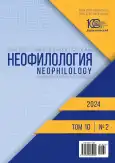Resilience and tolerance to uncertainty among military journalists in new information and communication conditions
- Authors: Kolobova S.V.1
-
Affiliations:
- Mariupol State University named after A.I. Kuindzhi
- Issue: Vol 10, No 2 (2024)
- Pages: 508-517
- Section: MEDIA COMMUNICATIONS AND JOURNALISM
- URL: https://journal-vniispk.ru/2587-6953/article/view/295612
- DOI: https://doi.org/10.20310/2587-6953-2024-10-2-508-517
- ID: 295612
Cite item
Full Text
Abstract
RELEVANCE. In the conditions of constant, constantly changing wars, hostilities and armed conflicts, the role of military journalists, or war correspondents, who broadcast to the whole world from the battlefield, transmit timely and high-quality information from battlefields. These are professionals who are subject to many demands in terms of psychological qualities, resilience and tolerance for uncertainty. A person who does not possess such qualities cannot perform this extremely dangerous and traumatic work. In addition, military journalists are under pressure in modern information and communications conditions, which makes their already difficult work more difficult. At the same time, at the moment there is very little research on the topic of what specific qualities and abilities war correspondents should have to successfully carry out their professional activities. The purpose of the study is to study the factors of resilience and tolerance of uncertainty among military journalists.MATERIALS AND METHODS. An empirical study was conducted on the resilience and tolerance of uncertainty of 54 war correspondents and 50 journalists who are not involved in covering military events. We studied used the methods of “Vitality Test” by D.A. Leontyev and E.I. Rasskazova and “Uncertainty Tolerance Scale” by T.V. Kornilova.RESULT AND DISCUSSION. Statistically significant differences in indicators of resilience and tolerance to uncertainty were identified between groups of war correspondents and journalists, and significant relationships between indicators of resilience and tolerance to uncertainty in groups of war correspondents and journalists were identified and described.CONCLUSION. The conducted research makes it possible to form a picture of what personal characteristics war correspondents have and to highlight those traits that help them cope with dangerous and stressful working conditions
About the authors
S. V. Kolobova
Mariupol State University named after A.I. Kuindzhi
Author for correspondence.
Email: prgaga@mail.ru
ORCID iD: 0000-0002-8518-8799
Senior Lecturer
129A Stroiteley Ave., Mariupol, 87500, Russian FederationReferences
- Morales R.F., Perez V.R. Posttraumatic stress symptoms in Mexican journalists covering the drug war. Suma Psicologica, 2012, no. 1, pp. 7-17.
- Feinstein A., Owen J., Blair N. A hazardous profession: war, journalists, and psychopathology. American Jour-nal of Psychiatry, 2002, vol. 159, no. 9, pp. 1570-1575. https://doi.org/10.1176/appi.ajp.159.9.1570
- Bondarenko M.B. Personal potential and success of military professionals. Vestnik Yaroslavskogo gosudarstvennogo universiteta im. P.G. Demidova. Seriya Gumanitarnye nauki = Vestnik of Demidov Yaroslavl State University. Series: Humanities, 2017, no. 4 (42), pp. 96-99. (In Russ.) https://elibrary.ru/zxwdxx
- Sokolova D.V. The specifics of women’s work in hot spots: studying Russian and foreign reporters’ experience. Vestnik Moskovskogo universiteta. Seriya 10. Zhurnalistika = Moscow University Bulletin. Series 10. Journal-ism, 2015, no. 3, pp. 24-45. (In Russ.) https://elibrary.ru/sanhiw
- Kolobova S.V. Features of coping strategies of journalists covering events of a special military operation. Vest-nik Tverskogo gosudarstvennogo universiteta. Seriya: Pedagogika i psikhologiya = Vestnik of Tver State Uni-versity. Series: Pedagogy and Psychology, 2023, no. 3 (64), pp. 248-254. (In Russ.) https://doi.org/10.26456/vtpsyped/2023.3.248, https://elibrary.ru/lajogl
- Slyshkin G.G., Malygina L.E., Pavlova E.S. Linguistic security in the context of value, ideological and social changes. Verkhnevolzhskii filologicheskii vestnik = Verhnevolzhski Philological Bulletin, 2022, no. 1 (28), pp. 64-69. (In Russ.) https://doi.org/10.20323/2499-9679-2022-1-28-64-69, https://elibrary.ru/mddibm
- Slyshkin G.G., Malygina L.E., Pavlova E.S. Linguistic security in the context of value, ideological and social changes. Verkhnevolzhskii filologicheskii vestnik = Verhnevolzhski Philological Bulletin, 2022, no. 2 (29), pp. 53-60. (In Russ.) https://doi.org/10.20323/2499-9679-2022-2-29-53-60, https://elibrary.ru/esrbch
- Malygina L.E. The problem of desacralization of contemporary linguistic consciousness. Mir russkogo slova = World of the Russian Word, 2017, no. 1, pp. 68-71. (In Russ.) https://elibrary.ru/yhhnqr
Supplementary files









